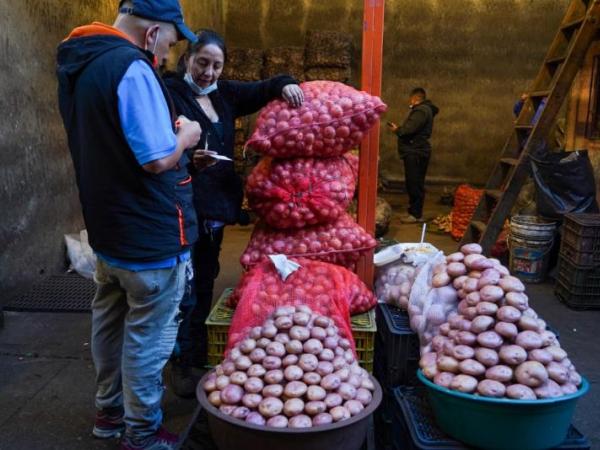The current situation of 2022, framed by a high inflation which is already at 8.01%, the election year, as well as the global crisis due to both the pandemic, at an economic level, and due to Russia’s invasion of Ukraine, they have undermined the confidence of ordinary citizens. This was reflected in the results of the Social Pulse survey for the month of February that Dane released this Friday, since the Consumer Confidence Indicator recorded a new decline (1.0 points) and reached a level of 34.9 points.
(See: In 2021, credits in the country increased 42%).
The survey, which is being carried out by dane since July 2020 as a result of the pandemic, he highlighted inflation as one of the factors that has generated an impact in recent months on both the perceptions of families and their pockets.
“The feeling of worsening, the perception that the country’s economic situation will be worse in 12 months grows by 4.6 points, and confirms that it is the considerations of the macroeconomic environment that are generating more uncertainty, especially due to inflation”, indicated the director of Dane, Juan Daniel Oviedo.
An example of this is the fact that 62.1% of the heads of households argue that they are less likely to buy basic items such as clothing, shoes or food compared to a year ago. Likewise, 30.7% indicate that they have the same possibility of acquiring this type of basic goods, while only 7.3% argue that they have more possibilities of buying basic or essential items.
According to Oviedo, This shows how the purchasing power of households has deteriorated.
(See: Women continue to access credit in a lower proportion: why).
Another indicator of the economic situation of families is reflected in their ability to save part of their income, a situation that only applies to 17.9% of household heads. Similarly, 75.1% say they have no way of saving part of their monthly income, and even 6.9% argue that they currently have no income.
In addition, 84.9% of the people who are the head of the household said that they will not have money available in the next 12 months to go on vacation.
One of the results left by the Social Pulse is a not very optimistic outlook for both the situation of households and the country for the next year. When asking about the economic situation of the country, in February 2022, 57.6% said that it was worse than the one experienced in the same month of the previous year and for 13.6% it was ‘much worse’. Regarding their projections, for 38.4% the situation of their home will be the same in a year, for 29.4% it will be better and for 22.4% it will be worse.
The issue of prices is another of the great concerns of households. Social Pulse surveyed how people believe prices will behave in the country in the next 12 months. 92% believe that they will continue to see an increase in the value of the products. 69.7% of household heads consider that prices will increase much faster in the next year, 14.1% believe that they will increase the same, 8.2% consider that they will increase, although little, while 6.3 % believe that they will remain the same and 1.6% that they will decrease little.
FOOD SAFETY
Another element that shows the situation of families is related to food intake in terms of basic food security by the ability to consume the three basic daily rations.
For the survey, the Dane considers 7.5 million households, and in February it was shown that there are 1.42 million families that ate three meals or more before the pandemic and have gone on to eat only 2 servings.
“21.1% of households that consumed meals a day or more before the pandemic have now consumed two meals. That is why in February we have 70.7% of households reporting eating 3 meals a day or more, it is an improvement compared to February 2021, which was 70%.”, highlighted the director of Dane, who assured that a “stabilization” is taking place, close to 70% of households for the three daily rations. This, however, contrasts with the fact that around 90% of households ate three meals a day before the pandemic.
(See: What are the chances of a new tax? Anif answered).
At present, on the contrary, one has to 26.8% of households consume 2 servings a day (more than 2 million families), 2.4% barely eat once a day (179,271 families) and 0.1% of families sometimes do not eat once a day (8,147).
2.4% barely eat once a day (179,271 families).
POSITION BEFORE VACCINATION
According to the survey, 73.8% of household heads said they had not been infected with coronavirus, 25.9% had been infected and recovered ye0.2% was infected at that time.
(See: As of February, 2022 PGN commitments were $87.3 billion).
In February 2022, 95.6% of heads of households in the capitals and metropolitan areas said they were interested in receiving the coronavirus vaccine, 2.9% said they were not interested, and 1.4% He is not vaccinated but he is interested. When asked how many doses of the vaccine have already been applied, 54.5% of people 55 years of age or older, 65.9% of people 25 to 54 years of age and 47.5% of young people 10 to 24 years had received two doses. The main reason for those who have not been vaccinated was lack of time (47.1%). Finally, 85.6% of the heads of households would be willing to apply an additional booster.
LAURA LUCIA BECERRA ELEJALDE
Journalist Portfolio








